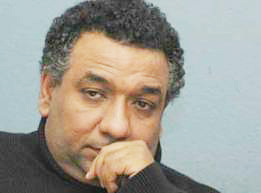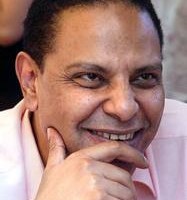Columnists find much to criticise in President Mohamed Morsy during the past period. Much concerns lingering thoughts regarding the Cairo Stadium celebration and its alleged shortcomings, while some are a result of his Muslim Brotherhood affiliation.
The bulk of it, however, relates to the 100-day plan and its perceived failures, and what many columnists view as the president’s misguided priorities and inability to tackle the key issues.
Who will win in the 100-day race?
Akram Al-Qasaas
Al Youm Al-Sabaa
Akram Al-Qasaas laments the current state of the Egyptian political scene, which in his view has become a zero sum competition, in which the ruling political force shuts out the opposition and runs the country by itself.
He criticises President Mohamed Morsy for focusing on silencing his detractors and responding to his critics, particularly during his latest speech in Cairo Stadium. Al-Qasaas claims that the president provided a myriad of numbers and statistics that were more akin to a justification of the current state of affairs than a declaration of successes.
President Morsy, according to the columnist, is too busy responding to criticism to express a wider vision for the future of Egypt and the major elements of its development such as healthcare and education.
Al-Qasaas points to the alleged absence of such a vision in the president’s articulation of his goals and outlook so far, and he claims the presence of such a vision is absolutely necessary in the ruling institution of a country as vast as Egypt.
In addition, the author attacks the lack of a clear, precise strategy for effectively dealing with corruption and eliminating it.
Al-Qasaas deems it necessary to provide a reminder that we are not in a football match or a war, and that in the end it is not about who is the victor. He hopes that the country will escape the zero-sum mentality and get past the 100-day race, tackling more important issues ahead.
Maspero was the turning point
Wael Abdel fattah
Al-Tahrir
Expressing outrage at the fact that President Mohamed Morsy failed to make a single mention of the infamous and bloody events of Maspero in his Cairo Stadium speech, Wael Abdelfattah recalls the tragic events of 9 October 2011, and deems it offensive that the killers have not been brought to justice.
Abdelfattah writes that the president did not meet his promise to bring the killers to justice, and claims that even if Field Marshall Tantawi were to be presented by President Morsy as a scapegoat, it would not be enough to avenge the deaths of the Maspero martyrs.
The columnist views the issue to be indicative of a much greater problem in Egypt that must be rectified. This is the current relationship between the rulers who kill and protect killers and the ruled sacrificed for the sake rulers’ power.
Abdelfattah devotes a portion of his column to Tantawi, whom he claims was a talentless bureaucrat who maintained his position via his loyalty to the political authority, and whom he accuses, along with his military cohorts, of committing major crimes and atrocities against the Egyptian people.
Disposing of the Field Marshall is considered by the author to be the only major achievement of President Morsy’s first 100 days in office, and he wonders whether even that was merely cover for a deal to secure a safe exit without trial for military leaders involved in the crimes of the transitional period.
He says claims that military rule and the “state of the officers” has ended with the removal of Tantawi and former Chief of Staff Sami Ennan, are an exaggeration. He believes the military has only retreated from the spotlight, but will continue to pursue its regular activities, only now with new partners.
The Art of Putting on Shoes
Alaa’ Al-Aswany
Al-Masry Al-Youm
In a fierce attack on the Muslim Brotherhood, Alaa’ Al-Aswany claims that the Brotherhood is founded on the principles of blind, degrading obedience to superiors. He writes that the Muslim Brotherhood has one mind, the general guidance bureau headed by General Guide Mohamed Badie’, and that all of the Brotherhood’s youth are mere tools to the achievement of this body’s vision.
Al-Aswany provides two highly contrasting stories in order to illustrate his claims. First, he tell a story from the 1940s, in which a junior officer in the Royal Guard of King Farouk refused his superior’s orders to open the car door for the king due to the fact that it was not his job, telling his superior to do it himself.
The second story is a very recent one of a young man clambering to reach the Muslim Brotherhood’s general guide at the door of a mosque following a sermon, in order to put on the man’s shoes for him.
He points to the latter story as evidence of the Brotherhood’s blindly hierarchical framework and launches into a tirade against the group’s alleged internal dogma, which is based on the sanctity of the general guide and his opinions.
The columnist uses this as in entrance into a critique of President Mohamed Morsy’s 100 days in office, which he believes has proven three things: that the president is a man who promises but does not deliver, that he does not have a political vision greater than that of former president Hosni Mubarak, and that he is a member of an outlawed group, one which most probably dictates his actions.
The cylinder explodes in the face of the “Renaissance”
Emad El-Din Hussein
Al-Shorouk
Emad El-Din Hussein articulates the point that the most pressing challenge facing President Mohamed Morsy and the Muslim Brotherhood today is poverty, the grievances it is fomenting, and the complex system of corruption maintaining its continued existence.
Hussein argues that ordinary citizens are not concerned with the 100-day plan, the Renaissance project or why the president entered Cairo Stadium in an open car. What concerns them the most, according to Hussein, is the liquefied petroleum gas cylinder they need for household use, the price of which has jumped to several multiples of its official, designated, subsidised price.
He goes on to mention bread lines, fuel shortages and other predicaments afflicting the everyday life of the ordinary citizen, alleging that the framework of corruption incepted during Mubarak’s rule has not been dismantled, but rather taken over by those claiming to be from the camp of the Muslim Brotherhood’s Freedom and Justice Party.
Hussein warns the Brotherhood and their party that the challenge poverty presents to them is greater than that of the constitution writing process, liberal opponents, or any other political obstacle.
The government’s applause!
Khairy Ramadan
Al-Watan
Khairi Ramadan centres his column around an observation made during President Mohamed Morsy’s Cairo Stadium speech, that the cabinet with all of its members were applauding mindlessly and enthusiastically to everything the president said, including that which warranted no applause.
He claims that the entire audience, allegedly made up of Brotherhood members and supporters in its overwhelming majority, followed a similar trend of needless applause and overt enthusiasm, withering the president’s image of “a president for all Egyptians.”
The columnist also expresses the view that the 6 October celebration was not the time for an exhibition of the President’s achievements during the first 100 days in office.
Ramadan calls for less vague warnings and accusations from the president, and more clear plans, revolutionary decisions, and thinking outside the box.








